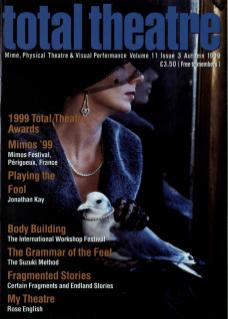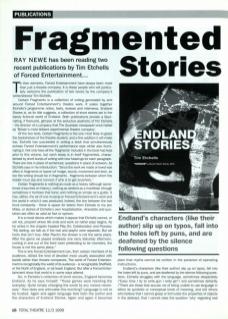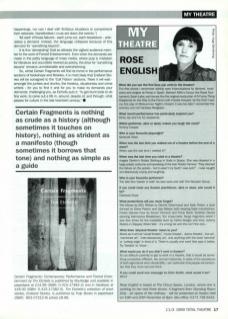To their admirers, Forced Entertainment have always been more than just a theatre company. It is these people who will particularly welcome the publication of two books by the company's writer/director Tim Etchells.
Certain Fragments is a collection of writing generated by and around Forced Entertainment's theatre work. It yokes together Etchells' programme notes, texts, reviews and interviews. Endland Stories is, as its title suggests, a collection of short stories set in the barely fictional world of Endland. Both publications provide a fascinating, if fractured, glimpse at the seductive aesthetic of Tim Etchells – the director of a company that The Guardian newspaper once hailed as 'Britain's most brilliant experimental theatre company'.
Of the two texts, Certain Fragments is the one most likely to grace the bookshelves of the theatre student; and a fine addition it will make too. Etchells has succeeded in writing a book that simultaneously echoes Forced Entertainment's performance style whilst also illuminating it. Not only have all the ‘fragments’ included in the book had lives prior to this volume, but each essay is in itself fragmented, characterised by short bursts of writing with new headings for each paragraph. There are lists in place of sentences; questions in place of answers. As Etchells says in his introduction: ‘Since the work we made or loved was often in fragments or layers (of image, sound, movement and text), so too the writing should be in fragments – fragments between which the reader must slip and connect if s/he is to get anywhere.’
Certain Fragments is nothing as crude as a history (although sometimes it touches on history), nothing as strident as a manifesto (though sometimes it borrows that tone) and nothing as simple as a guide. It has, rather, the air of one musing on Forced Entertainment's work and the world in which it was produced. Indeed, the line between the two blurs constantly – there is space for letters from Etchells to his son Miles, or stories of Etchells' own hospitalisation. Anecdote and quotation are often as valid as fact or opinion.
It is a novel device which makes it appear that Etchells cannot, or will not, pinpoint where life ends and work (or rather play) begins. As he writes in the chapter headed ‘Play On: Collaboration and Process’: ‘My darling, we talk as if the real and playful were separate. But we know that isn't true. After Psycho the shower is not the same place. After the game we played endlessly one rainy Saturday afternoon, rushing in and out of the front room pretending to be monsters, the house is not the same place.’
This is why Forced Entertainment can, from certain members of its audience, attract the kind of devotion most usually associated with bands rather than theatre companies. The world of Forced Entertainment is recognisably the world of its audience – is recognizably Sheffield, or the North of England, or (at least) England. But after a Forced Entertainment show that world is in some ways altered.
So, in Etchells' collection of short stories, England becomes Endland. As he says himself: ‘Those games were rewriting the everyday. Quite simply changing the world by any means necessary.’ How does one articulate this rewriting? Language is not to be trusted. Again and again language fails both the author and the characters of Endland Stories. Again and again it becomes plain that myths cannot be written in the parlance of operating instructions.
Endland's characters (like their author) slip up on typos, fall into the holes left by puns, and are deafened by the silence following questions. Etchells struggles with the language, sometimes desperately (‘Every time I try to write gun I write gin’) and sometimes defiantly (‘There are those that accuse me of being unable to use language in either its symbolic or conceptual kinds of meaning, and still others who believe that I cannot grasp or formulate the properties of objects in the abstract, that I cannot raise the question why regarding real happenings, nor can I deal with fictitious situations or comprehend their rationale. Nonetheless I must set down the events.’)
Yet each of these failures – each jump cut, each breakdown – articulates a demand. Indeed, the language collapses because of this demand for ‘something beyond'.
It is this 'demanding’ that so attracts the vigilant audience member to the work of Forced Entertainment. Even when the demands are made in the paltry language of mass media, where pulp is mistaken for literature and soundbite revered as poetry, the drive for something beyond remains unmistakable and overwhelming.
So, whilst Certain Fragments will find its home in the performance sections of bookshops and libranes, it is most likely that Endland Stories will be consigned to the 'Cult Fiction' sections. There it will wait – amongst the junkies and drunks, the heretics, situationists and crime writers – for you to find it and for you to make its demands your demands; challenging you, as Etchells puts it: ‘to get blunt tools to do fine work, to carve out a life in, around, despite of, and through, what passes for culture in the late twentieth century’.
Certain Fragments: Contemporary Performance and Forced Entertainment by Tim Etchells is published by Routledge and available in paperback at £14.99 (ISBN: 0-415-17383-3) and in hardback at £45.00 (ISBN: 0-415-17382-5). Tim Etchells' collection of short stories, Endland Stories, is published by Pulp Books in paperback (ISBN: -901-07212-6) priced £8.99.


